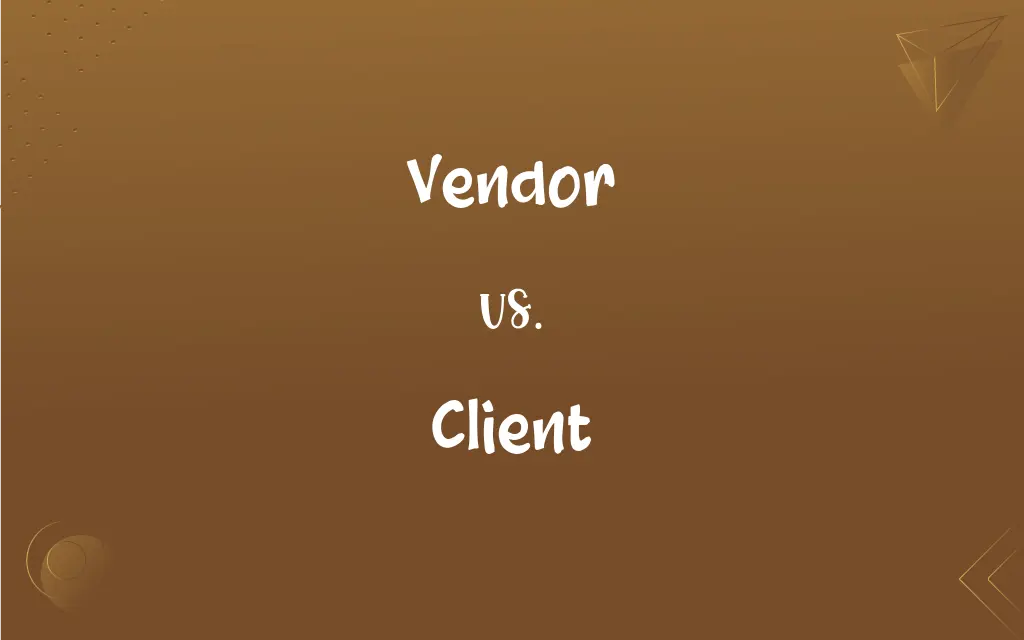Vendor vs. Client: What's the Difference?
Edited by Aimie Carlson || By Janet White || Published on December 17, 2023
A vendor is a party that sells goods or services, while a client is a party that purchases or receives these goods or services.

Key Differences
A vendor is an individual or a company that provides products or services, often as part of a supply chain. Clients, on the other hand, are individuals or companies that receive these products or services, typically in exchange for payment. This relationship is fundamental to business transactions, where vendors aim to meet the needs and demands of their clients.
In the dynamic of a vendor-client relationship, the vendor's primary role is to offer something of value, be it goods, services, or expertise. The client, conversely, is the recipient of this value, seeking to fulfill a specific need or objective through the vendor's offerings. Both roles are crucial, with vendors providing solutions and clients driving demand.
From a financial perspective, vendors are the revenue generators in the relationship. They invoice for their goods or services. Clients, in contrast, are the source of this revenue; they are the ones who pay for the goods or services received. This monetary exchange underscores the symbiotic nature of the vendor-client relationship.
Communication is key in the vendor-client relationship. Vendors must effectively convey information about their offerings and understand the needs of their clients. Clients, for their part, need to communicate their requirements and feedback clearly to the vendors. This two-way communication facilitates successful business engagements.
In the vendor-client dynamic, trust and reliability are paramount. Vendors must be trustworthy and reliable in delivering quality products or services, while clients should be dependable in terms of timely payments and clear communication. This mutual trust strengthens the business relationship.
ADVERTISEMENT
Comparison Chart
Role in Transaction
Sells or provides services
Purchases or receives services
Financial Direction
Receives payment for offerings
Pays for the received services
Communication Focus
Offers information about goods/services
Expresses needs and feedback
Dependability
Must be reliable in delivery
Must be reliable in payment
Objective
To meet clients' needs
To fulfill specific requirements
ADVERTISEMENT
Vendor and Client Definitions
Vendor
A vendor is a provider of services.
Our IT vendor handles all our software needs.
Client
A client is a customer who purchases goods or services.
The salon's client booked a hair appointment.
Vendor
A vendor is a seller of goods.
The street vendor sold handmade crafts.
Client
In professional services, a client is an entity receiving expert advice.
The lawyer advised her client on legal matters.
Vendor
In technology, a vendor refers to a software or hardware provider.
Microsoft is a leading software vendor.
Client
A client can be a person or organization using services.
The advertising agency gained a new client.
Vendor
A vendor can be a company or individual in a supply chain.
The vendor supplied the restaurant with fresh produce.
Client
In computing, a client is a computer or program receiving data from a server.
The web browser client requested data from the server.
Vendor
In legal terms, a vendor is a party in a contract of sale.
The vendor agreed to the terms of the house sale.
Client
In a legal context, a client is a party represented by an attorney.
The attorney represented his client in court.
Vendor
One that sells or vends something
A street vendor.
A vendor of software products on the Web.
Client
The party for which professional services are rendered, as by an attorney.
Vendor
One that provides products or services to a business for a fee.
Client
A customer or patron
Clients of the hotel.
FAQs
What is a vendor?
A vendor is a person or entity that sells goods or services.
Can a vendor also be a client?
Yes, a vendor can be a client in different transactions.
What's the main goal of a vendor?
The main goal of a vendor is to provide products or services to clients.
Can a client negotiate with a vendor?
Yes, clients can often negotiate terms or prices with vendors.
Who is a client?
A client is an individual or business that purchases or uses services or goods.
How do vendors attract clients?
Vendors attract clients through marketing, quality offerings, and competitive pricing.
What's crucial for a client when selecting a vendor?
Clients often prioritize reliability, quality, and cost-effectiveness.
Why is customer service important for vendors?
Good customer service helps vendors retain clients and build reputation.
What should clients look for in vendor contracts?
Clients should look for clear terms, pricing, and service level agreements.
What does a client seek from a vendor?
A client seeks quality goods or services that meet their needs.
Do vendors always have fixed prices?
Vendors may have fixed or negotiable prices, depending on the industry and product.
How do vendors handle client disputes?
Vendors typically address disputes through customer service or legal channels.
Do clients have rights in transactions?
Yes, clients have rights such as fair treatment and receiving what they pay for.
Can a client be a one-time customer?
Yes, clients can engage in one-time transactions without ongoing relationships.
What is client satisfaction?
Client satisfaction measures how well a vendor's goods or services meet client expectations.
What's a long-term client?
A long-term client repeatedly uses the same vendor's services or products.
What is a preferred vendor?
A preferred vendor is one that a client regularly chooses for its reliability and quality.
Can vendors refuse service to a client?
Vendors can refuse service under certain legal and ethical guidelines.
How can clients provide feedback to vendors?
Clients can provide feedback through reviews, surveys, or direct communication.
What is a vendor contract?
A vendor contract is a legal agreement outlining the terms of service or product delivery.
About Author
Written by
Janet WhiteJanet White has been an esteemed writer and blogger for Difference Wiki. Holding a Master's degree in Science and Medical Journalism from the prestigious Boston University, she has consistently demonstrated her expertise and passion for her field. When she's not immersed in her work, Janet relishes her time exercising, delving into a good book, and cherishing moments with friends and family.
Edited by
Aimie CarlsonAimie Carlson, holding a master's degree in English literature, is a fervent English language enthusiast. She lends her writing talents to Difference Wiki, a prominent website that specializes in comparisons, offering readers insightful analyses that both captivate and inform.































































